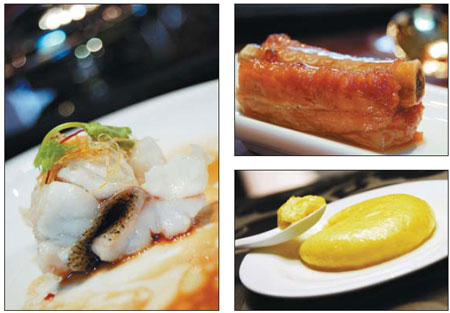Eating like an empress is a family affair
Updated: 2013-06-22 08:27
By Xu Junqian in Shanghai (China Daily)
|
||||||||
|
Clockwise from left: Fried grouper with soy sauce, sweet and sour ribs and fried egg custard are three signature dishes at Family Li Imperial Cuisine restaurant in Shanghai. Photos Provided to China Daily |
With a menu once favored by Empress Dowager Cixi in the Qing Dynasty (1644-1911), one of the most extravagant rulers in Chinese history, the Family Li Cuisine has plenty of lures to woo modern foodies.
The family patriarch, Li Shunqing, was once the lord secretary to the imperial household of the Qing Dynasty, responsible for overseeing the imperial kitchen. The bearers of that legacy have been unsparing in their efforts to preserve the menu for the past decades, treating the palace cuisine more as an art than a business.
Started in the 1980s as a one-table eatery deep in a hutong in Beijing by the offspring of Li Shunqing, the restaurant has received notable diners such as Bill Clinton and Bill Gates. In 2006 it branched out to Shanghai's Bund, and recently offered a tasting lunch for the local media to celebrate its affiliation with the global luxury hotel and restaurant group Relais & Chateaux.
Among the 10 appetizers, the stir-fried green-bean paste with fresh scallop, which in Chinese is beautifully named "jade tofu", is a good choice to start dinner. Flavored with a handful of hot chili pepper, the fresh taste of scallop is fully brought out.
The shredded duck meat with Chinese cabbage is like having a juicy salad but more carnivorous. The sweet-and-sour pork ribs are the best I have ever tasted, topping all of the versions I've had in East China, supposedly the home of the dish. Here it's lighter and more sour, less glutton-inspiring than the eastern ones.
A surprise, if not a shock, is the deep-fried camel hump. This is the first time I have eaten anything from a camel, and not until I happily put the diced meat cube into my mouth was I told it came from the front humps of the beasts in the Inner Mongolia autonomous region. It tastes similar to other animal meat I have had, and the chef said great efforts have been made to get rid of the camel's usual gamey smell.
The dish is said to be one of the "eight mountain delicacies" enjoyed by the empresses and emperors of past times. Others include bear paws, monkey brains, ape lips and leopard fetuses. Does that make the camel hump sound the least savage dish of all?
For main courses, we are served lobster with Beijing flavor, fried grouper with soy sauce, and stir-fried eggplant.
The imported lobster seems well-suited to the traditional Beijing cooking method, which delivers a richer taste than the common technique of grilling with cheese. The grouper is savory but forgettable, and the eggplant is divine enough to make me think being vegetarian would not be that awful - though I later found its good flavor comes from the pork and shrimp cooked with it.
The sensually most impressive dish of the meal was the boiled soup with minced prawns and seaweed.
In spite of the name, the "weed" used in the soup is actually a freshwater kind found in a pristine lake on the border of Hubei and Hunan provinces. It is said to get its name, gexianmi, from a hermit surnamed Ge who discovered the obscure little grass and found it can promote longevity.
Fairy-tale aside, the soup serves as a perfect transition, offering a light and palate-cleansing finish to the main courses that whet your appetite for dessert.
Dessert comes as an assortment of "petite three", baked fresh milk, fried egg custard and sweet bird's nest with green beans and water chestnut, all in bite-size portions. The last one is said to be a summertime after-nap favorite of Cixi, who had four of her servants sit around a square table and rub the green beans one by one to peel off the hard skin. The contemporary rendition is refreshing, not very sweet, and cooling, but not so different from other green-bean soups despite the addition of bird's nest.
My personal favorite is the fried egg custard, which in Chinese is named "three non-stickiness" (not sticky to the chopsticks - or plate or teeth). A traditional and complicated dish, the golden-colored rice ball uses the most basic ingredients like flour, egg and sugar, but the mixture must be beaten more than 600 times so that the stickiness is lost while the pliability is preserved.
To add another sensation to the meal, gladden your heart with a stroll along the Bund. As darkness falls after dinner, the early summer's cool breeze blows against your face, as if flirting with you, and leaves behind a pleasant scent of cape jasmine.
xujunqian@chinadaily.com.cn

(China Daily USA 06/22/2013 page10)

 Manning gets 35 years in WikiLeaks trial
Manning gets 35 years in WikiLeaks trial
 At least 37 killed in Malaysian bus crash
At least 37 killed in Malaysian bus crash
 FM calls for closer Cambodia relations
FM calls for closer Cambodia relations Problems for rural kids in cities
Problems for rural kids in cities
 Search for escaped crocodiles continues
Search for escaped crocodiles continues
 Police break up baby trafficking ring
Police break up baby trafficking ring
 Jeremy Lin celebrates birthday in basketball clinic
Jeremy Lin celebrates birthday in basketball clinic
 Police identify suspect in US school shooting
Police identify suspect in US school shooting
Most Viewed
Editor's Picks

|

|

|

|

|

|
Today's Top News
Bo Xilai stands trial for bribery, embezzlement
Affluent tourists 'go it alone'; seek culture, good food
Sales of iPad fall as Android-based devices gain
Manning gets 35 years in WikiLeaks trial
Chinese workers detained in Russia
US spying raises tensions with China
Wildlife plan struck with Kenya
Egypt court orders Mubarak's release
US Weekly

|

|








